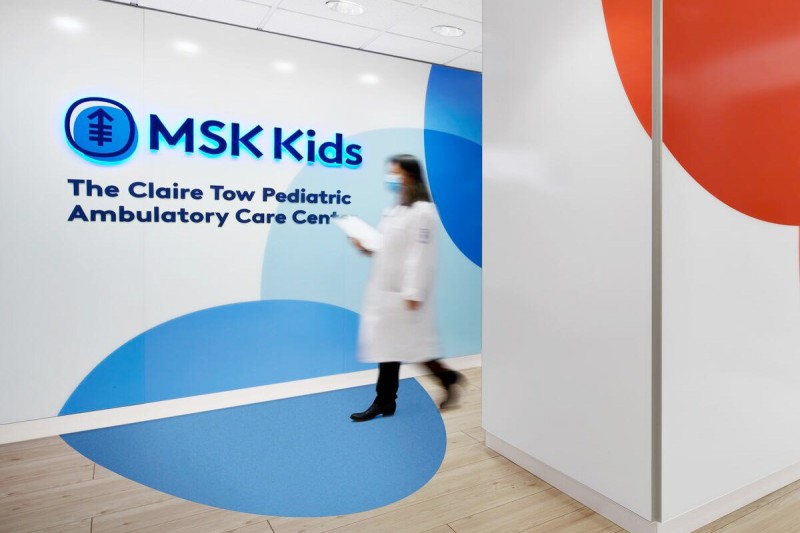
Physicians and researchers at MSK Kids, Memorial Sloan Kettering Cancer Center’s dedicated pediatric cancer program, completed several groundbreaking research studies in 2023. These studies, which focused on pediatric disease mechanisms, paved the way to promising new therapeutic approaches for improving patient outcomes.
“MSK Kids is the largest pediatric cancer program in the United States. We have a clear goal — to deliver the best possible treatment for each child entrusted to our care, and to learn from each patient,” says Andrew Kung, MD, PhD, physician-scientist and Chair of the Department of Pediatrics at MSK. “Our pediatric specialists collaborate with faculty across MSK on research and in the clinic to provide optimal care and drive new discoveries for cancers affecting infants to young adults.”
Below are six areas that saw important research and clinical advances for MSK Kids in 2023:
Cancer Genomics Reveals Complexities of Neuroblastoma and Osteosarcoma Evolution
MSK Kids researchers discovered malignant neuroblastoma clones arise early in development and can spread to metastatic sites before eventual diagnosis in childhood. Another MSK research team found chemoresistant osteosarcoma subclones are often present at diagnosis, and resistant clones emerge under selective pressure from neoadjuvant chemotherapy. These resistant clones have unique amplifications and genetic alterations.
Together, these insights suggest that targeting resistance-associated changes during upfront therapy may be an effective strategy for eliminating resistant tumor subclones and improving survival.
Cell Therapies for Curing Non-Malignant Diseases
Building on a 50-year legacy of leadership in stem cell and bone marrow transplantation, MSK Kids continues to pioneer cell therapies for definitive cures of non-malignant diseases in pediatric patients.
For example, MSK Kids researchers and colleagues treated three young adult patients with severe sickle cell disease using a novel CRISPR-Cas9 gene-edited cell therapy. The autologous treatment induced fetal hemoglobin in 70% to 88% of red cells and significantly lessened patients’ disease severity.
A multi-institutional retrospective analysis led by MSK investigators found that allogeneic hematopoietic cell transplantation (HCT) for Fanconi anemia provided excellent survival odds and low toxicity, particularly in patients under 19. The study demonstrated that matched unrelated donors and cord blood were good cell sources for patients without suitably matched sibling donors.
MSK Kids successfully cured a 6-year-old girl with a primary immune regulatory disorder (PIRD) caused by a STAT1 gain-of-function gene mutation. To dampen hyperimmune reactivity, the patient was treated with the interferon blocker emapalumab as a bridge to HCT. She achieved full T cell donor chimerism, with 100% donor chimerism and no graft-versus-host disease at one-year post-HCT. MSK is now conducting a phase 2 clinical trial investigating emapalumab in a larger group of patients with PIRD as a bridge to HCT.
Data Science Finds New Treatments for Pediatric Cancers
MSK Kids researchers continue to leverage novel data science approaches to reveal gene mutations and abnormally activated pathways that may be exploited for therapeutic benefit. Two major initiatives in 2023 were as follows:
MSK Kids and colleagues from Columbia University Irvine Medical Center validated two complementary RNA-based assays, OncoTarget and OncoTreat, that predict actionable drug responses. Agents identified by these tools achieved significant disease control rates of 68% and 91%, respectively, and 15 of 18 drugs identified by OncoTreat predicted master regulator module activity.
MSK is leading the multicenter phase 2 clinical trial of selinexor for patients with Wilms’ tumors and other solid tumors. The trial is based on the research team’s discovery of aberrant activation of the protein exportin-1 (XPO1) in aggressive pediatric malignant rhabdoid tumors and Wilms’ tumors compared to other tumor types, and that XPO1 inhibition significantly reduced tumor growth in patient-derived xenograft models of these cancers.
Advancing an Age-Unrestricted Approach to Defining New Treatment Targets
Working closely with MSK medical oncologists, MSK Kids is a leader in identifying biologically based therapeutic approaches without age limitations, such as contributing to the approval of NTRK inhibitors and checkpoint inhibitors for mismatch-repair deficient tumors in an age-agnostic manner.
MSK’s early translational work developing novel menin inhibitors advanced to a phase 1/2 clinical trial evaluating the menin inhibitor revumenib in children and adults with KMT2Aor NPM1 rearranged acute leukemias. The drug demonstrated promising antileukemic activity in both patient populations.
New Immunotherapy Approaches for Pediatric Patients
Building on MSK’s legacy of pioneering immunotherapies, MSK Kids continues to define new immunotherapeutic approaches that promise greater efficacy and reduced toxicity for solid tumors and hematologic cancers in pediatric patients.
MSK Kids investigators led a phase 2 clinical trial testing the addition of yeast-derived oral β-glucan during GD2/GD3 ganglioside vaccination in pediatric patients with high-risk, relapsed metastatic neuroblastoma. The novel strategy, developed at MSK, successfully increased the anti-GD2 IgG1 titer among responders without additional toxicity.
MSK Kids researchers also collaborated with colleagues at multiple centers to answer an important question about the efficacy of the anti-CD30 antibody-drug conjugate brentuximab vedotin as a consolidation therapy for autologous stem cell transplantation (ASCT) in pediatric patients with Hodgkin lymphoma. Their retrospective analysis of 67 patients showed this treatment was associated with a three-year progression-free survival rate of 85%, was well tolerated, and had a similar safety profile as in adult patients.
Expertise in Pediatric Surgical Oncology
MSK Kids achieved a notable distinction this year by earning designation as the first-ever Children’s Surgery Verification (CSV) Quality Improvement Program Level I Specialty Children’s Surgery Center in Oncology by the American College of Surgeons.
MSK Kids pediatric cancer surgeons have extensive experience performing surgeries to treat patients with common and rare tumors. They perform annually about 2,500 procedures on patients under the age of 18 and about 800 procedures on young adult patients with pediatric cancers across 14 surgical subspecialties.
One of the ways that set MSK’s approach apart is pairing pediatric surgeons with adult surgeons on diagnoses, treatment planning, procedures, and patient follow-ups for pediatric patients who require complex surgeries more often performed in adults. The breadth of surgical expertise across MSK makes collaboration fast and seamless. Learn more about MSK’s Approach to Complex Pediatric Surgical Oncology.